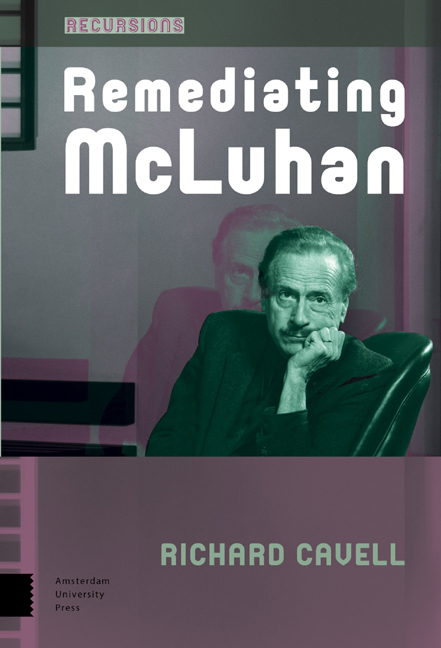Book contents
- Frontmatter
- Dedication
- Contents
- Introduction
- List of sigla
- I
- Re: Mediation
- 1 Beyond McLuhanism
- 2 McLuhan and the Question of the Book
- Embodiment as Incorporation
- 3 McLuhan and the Body as Medium
- 4 McLuhan, Tactility, and the Digital
- 5 Mechanical Brides and Vampire Squids
- Empathic Media
- 6 McLuhan: Motion: e-Motion: Towards a Soft Ontology of Media
- 7 Re-Mediating the Medium
- Determining Technology
- 8 McLuhan, Turing, and the Question of Determinism
- 9 Angels and Robots
- Being Mediated
- 10 Marshall McLuhan’s Echo-Criticism
- 11 McLuhan and the Technology of Being
- II
- 12 The Tragedy of Media: Nietzsche, McLuhan, Kittler
- Coda: On the 50th Anniversary of Understanding Media
- Notes
- Works Cited
- Index
- Frontmatter
- Dedication
- Contents
- Introduction
- List of sigla
- I
- Re: Mediation
- 1 Beyond McLuhanism
- 2 McLuhan and the Question of the Book
- Embodiment as Incorporation
- 3 McLuhan and the Body as Medium
- 4 McLuhan, Tactility, and the Digital
- 5 Mechanical Brides and Vampire Squids
- Empathic Media
- 6 McLuhan: Motion: e-Motion: Towards a Soft Ontology of Media
- 7 Re-Mediating the Medium
- Determining Technology
- 8 McLuhan, Turing, and the Question of Determinism
- 9 Angels and Robots
- Being Mediated
- 10 Marshall McLuhan’s Echo-Criticism
- 11 McLuhan and the Technology of Being
- II
- 12 The Tragedy of Media: Nietzsche, McLuhan, Kittler
- Coda: On the 50th Anniversary of Understanding Media
- Notes
- Works Cited
- Index
Summary
McLuhan is a medium and quite possibly a medium who is the message.
Donald Theall, The Medium is the Rear-View Mirror (1971)The McLuhan remediated in the following pages is the one who had become a cliché when Donald Theall wrote these words that presaged what eventually became a twenty-year decline in McLuhan's reputation. Theall's McLuhan was defined by the parameters of literary modernism, communications biases, hot and cool media and technological determinism. The publication of McLuhan's Letters in 1987, and Philip Marchand's biography in 1989, heralded a renaissance of interest in McLuhan that has continued unabated to the centennial conferences and confabulations of 2011 and beyond. While this current scholarly interest has assured McLuhan's foundational status as media theorist—affirmed by Friedrich Kittler no less—it has by no means exhausted the import of his writings, in large part because his written body of work as a whole is rarely revisited, and because ‘media’ retains a largely communicational bias in much of what has been written on him.
The McLuhan I write about here is a McLuhan whose thought resonates with contemporary media theory. When McLuhan wrote about the ‘digital computer’ in Understanding Media (McLuhan, 1964, p. 80), he did so to highlight the translational quality of the digital—that it can code anything into anything else—which suggested to him the importance of the interface and the resonating gap as the spacetime of electronic mediation. His writing embodied these insights. McLuhan argued that a linear approach to understanding electronic media could only fail, since the exponential increase in informational data could be understood only in terms of pattern recognition—what today is called visual analytics (although McLuhan would call these analytics ‘acoustic’ because they did not derive from perspectival space). Thus, we find McLuhan constantly coding and recoding his work, the medium is the message becoming the medium is the massage becoming the medium is the mess age becoming the medium is the mass age. His books were consistently montaged, cut and pasted, until he came to call them ‘non-books’—mashups of disparate traditions and high and low cultural references. And McLuhan consistently de-authorised himself after Understanding Media, writing (and re-writing) his work performatively as dialogues.
- Type
- Chapter
- Information
- Remediating McLuhan , pp. 9 - 12Publisher: Amsterdam University PressPrint publication year: 2016



